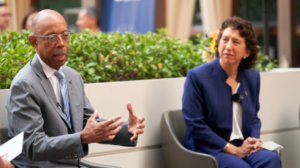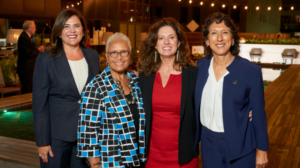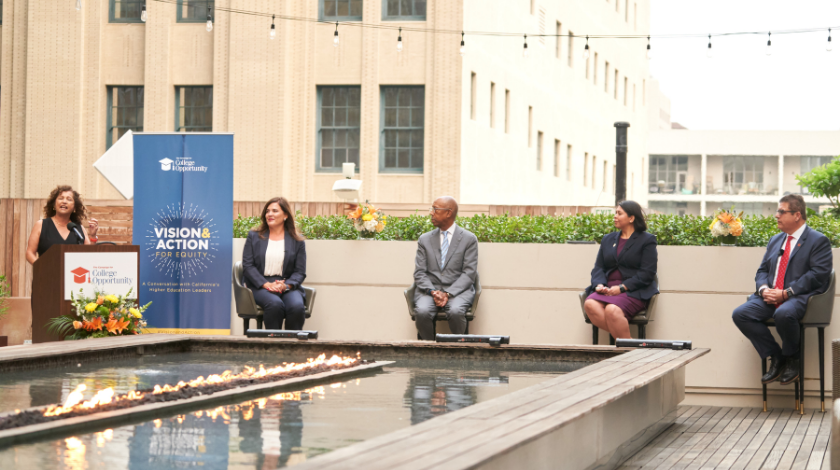(Left to right) Marlene Garcia, Michele Siqueiros, Dr. Michael V. Drake, Dr. Daisy Gonzalez, and Dr. Joseph Castro gather at an event hosted by the Campaign for College Opportunity. Photo by Leroy Hamilton.
The Michelson 20MM Foundation was honored to co-sponsor Vision and Action for Equity: A Conversation with California’s Higher Education Leaders on September 23, 2021. Hosted by the Campaign for College Opportunity, a Michelson Spark Grantee, the reception brought together higher education leaders throughout the state to discuss pressing issues and strategies to improve postsecondary education for students, with an emphasis on racial equity, the opportunity gap, basic needs, and financial aid.
California’s Higher Education Leadership
The first panel featured Dr. Michael V. Drake, president of the University of California; Dr. Daisy Gonzalez, acting chancellor of California Community Colleges; and Dr. Joseph Castro, chancellor of California State University. When asked what the most challenging thing is that students face today, the panelist identified financial issues as the greatest challenge. Pre-COVID, Dr. Castro noted, UC students already faced food and housing insecurity—an issue that the pandemic exacerbated. Furthermore, in addition to worsening the student basic needs crisis, COVID also forced widespread distance learning, causing universities to become online institutions overnight. With this shift in learning, the nation confronted the fact that broadband access is not a luxury—it is a right that everyone should have access to in the digital age.
Across all three systems, however, the students that disproportionately struggle to meet their basic needs and suffer from digital inequality tend to be first-generation students and students from underrepresented, marginalized backgrounds. Serving this student body and their families for generations requires increasing the number of faculty members from diverse backgrounds to ensure that students see themselves in their professors and learn in a nurturing environment.
University of California Leadership

Dr. Michael V. Drake (left) and Cecilia Estolano discuss ways to ensure that students can pursue a UC education. Photo by Leroy Hamilton.
During the second panel, Dr. Drake and Cecilia Estolano, chair of the University of California Board of Regents, dove into the issue of capacity and how to ensure deserving students can pursue a UC education. “[Education] absolutely transforms lives. It is the greatest engine of economic mobility we have in California…in the nation,” Estolano stated. One way to expand access is by leveraging remote instruction and hybrid instruction in rural areas and areas that have historically struggled with diversity and access. Simultaneously, the system can create educational hubs without building entire campuses, which would increase access to UC courses and degrees, while also providing a source of economic vitality for the surrounding communities.
California Community Colleges Leadership
Providing the perspective of California Community Colleges, Dr. Gonzalez re-joined the stage accompanied by Pamela Haynes, president of California Community College’s Board of Governors. While California’s Community Colleges have made great strides, particularly in the past five years, unfinished work remains, which is precisely what Dr. Gonzalez and Haynes addressed: “Every time we meet a goal, we have to go back to the drawing board and reimagine what California needs?” said Dr. Gonzalez. Haynes went on to note that while equity gaps are closing regionally, there is a need to address them at the zip code level; one way to do so is by increasing access to college-level math and English courses, or the “gateway courses.”
California State University Leadership
Moving to California State University, Dr. Castro, and Lillian Kimbell, chair of the Board of Trustees, addressed the issue of capacity and racial equity within their system. Although increasing funding and emergency aid may be an obvious solution to the college capacity crisis, accelerating graduation rates is another way to accommodate more students, Dr. Castro shared. For both prospective students and enrolled students, however, closing the equity gap is essential, and Kimbell argued that addressing student basic needs is the first step in doing so.
California Higher Education Board Leadership

(Left to right) Michele Siquieros poses with panelists Pamela Haynes, Lillian Kimbell, and Cecilia Estolano. Photo by Leroy Hamilton.
The fifth and final panel of the night featured three board leaders from the University of California, California Community Colleges, and California State University. Estolano, Haynes, and Kimbell stressed the importance of acting with a sense of urgency and the need to apply a racial equity lens to every piece of work tackled. As a motivation for all, “You have to have the best intentions, dig deeper, go farther, go faster.”
Guiding the Nation in the Post-Affirmative Action Era
In closing, Thomas Saenz, president and general counsel at MALDEF, tasked the audience with a homework assignment. After recalling the history of affirmative action and how we, as a nation and state, got to where we are, Thomas asked: “The eyes of the country will turn to us in California and they will ask us, what did you learn?”
With that, Thomas encouraged the audience to light productive—and metaphorical—fires under the feet of legislators, governors, and administrators as we work together to build a better, more inclusive higher education ecosystem.
Special thank you to the Campaign for College Opportunity, the speakers, and our co-sponsors: California State University Los Angeles, San Francisco State University, Fresno State University, University of California Riverside, University of Merced, and California State University San Bernardino.
Michelson 20MM is a private, nonprofit foundation seeking to accelerate progress towards a more just world through grantmaking, operating programs, and impact investing. Co-chaired and funded by Alya and Gary Michelson, Michelson 20MM is part of the Michelson Philanthropies network of foundations.

